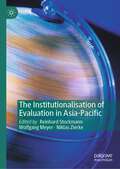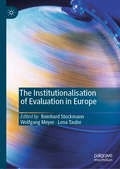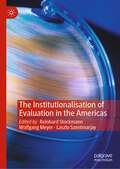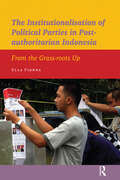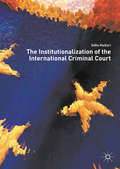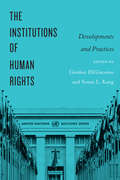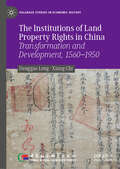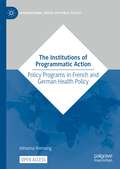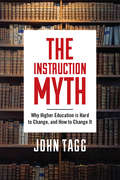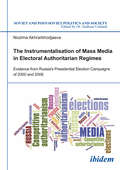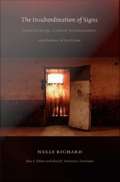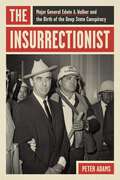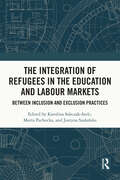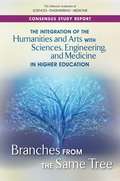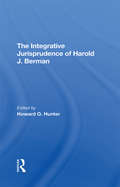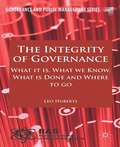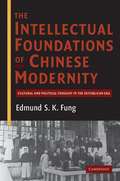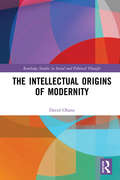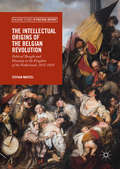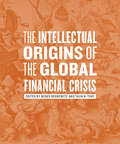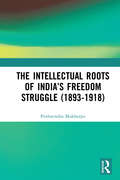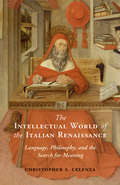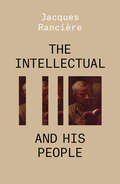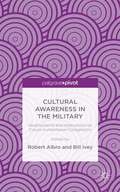- Table View
- List View
The Institutionalisation of Evaluation in Asia-Pacific
by Reinhard Stockmann Wolfgang Meyer Niklas ZierkeThis book examines the progress of institutionalisation of evaluation in Asia Pacific from various perspectives. It presents prior developments and current states of evaluation in 11 countries, focusing on three dimensions, namely the political, social and professional systems. These detailed country reports, which have been written by selected researchers and authors of the respective countries, lead to a concluding comparison and synthesis. This is the third of four volumes of the compendium The Institutionalisation of Evaluation. The first volume on Europe was published in 2020, and the second volume on the Americas in 2022. It will be followed by another volume on Africa. The overall aim is to provide an interdisciplinary audience with cross-country learning to enable them to better understand the institutionalisation of evaluation in different nations, world regions and sectors.
The Institutionalisation of Evaluation in Europe
by Reinhard Stockmann Wolfgang Meyer Lena TaubeThis book examines the progress of institutionalisation of evaluation in European countries from various perspectives. . It describes both prior developments and current states of evaluation in 16 European countries and across the European Union (EU), focussing on three dimensions, namely the political, social and professional systems. These detailed country reports, which have been written by selected researchers and authors from each of the respective countries, lead to a concluding comparison and synthesis. This is the first of four volumes of the compendium The Institutionalisation of Evaluation to be followed by volumes on the Americas, Africa and Australasia. The overall aim is to provide an interdisciplinary audience with cross-country learning to enable them to better understand the institutionalisation of evaluation in different nations, world regions and different sectors.
The Institutionalisation of Evaluation in the Americas
by Reinhard Stockmann Wolfgang Meyer Laszlo SzentmarjayThis book examines the progress of institutionalisation of evaluation in American countries from various perspectives. It presents prior developments of evaluation and current states of 11 American countries and three transnational organisations concerning three dimensions, namely the political, social and professional system. These detailed country reports, which have been written by selected researchers and authors of the respective countries, lead to a concluding comparison and synthesis. This is the second of four volumes of the compendium The Institutionalisation of Evaluation. The first volume on ‘Europe’ was published in 2020. After the publication of the ‘Americas’ – volume in 2021 it will be followed by two more volumes on ‘Asia and Pacific’, and ‘Africa’. The overall aim is to target an interdisciplinary audience and offer cross-country learning as it enables to better understand the institutionalisation of evaluation in different national states and world regions as well as in different sectors.
The Institutionalisation of Political Parties in Post-authoritarian Indonesia: From the Grass-roots Up (IIAS Publications series)
by Ulla FionnaThe Institutionalisation of Political Parties in Post-authoritarian Indonesia: From the Grass-roots Up provides detailed examination of how much the local party branches of Partai Golkar, Partai Demokrasi Indonesia Perjuangan, Partai Amanat Nasional, and Partai Keadilan Sejahtera in Malang (East Java) have institutionalized since the end of New Order era (1966-1998). Based on extensive fieldwork and observation, this book provides a new bottom-up perspective on how activities, administration and membership of each party has changed, and why some parties have more developed organizational prowess and stronger institutional base than others.
The Institutionalization of the International Criminal Court
by Salla HuikuriThis book explores the institution of the International Criminal Court (ICC) as a policy instrument. It argues that after the Cold War the European Union started challenging the unilateral policies of the United States by promoting new norms and institutions, such as the ICC. This development flies in the face of traditional explanations for cooperation, which would theorize institutionalization as the result of hegemonic preponderance, rational calculations or common identities. The book explains the dynamics behind the emergence of the ICC with a novel theoretical concept of normative binding. Normative binding is a strategy that provides middle powers with the means to tie down the unilateral policies of powerful actors that prefer not to cooperate. The idea is to promote new multilateral norms and deposit them in institutions, which have the potential to become binding even on unilateralist actors, if the majority of states adhere to them.
The Institutions of Human Rights: Developments and Practices
by Gordon DiGiacomo Susan KangWritten from a global perspective, The Institutions of Human Rights is a contributed volume that examines international human rights institutions, procedures, and select issues. Closely examining international human rights organizations including the International Labour Organization, the International Criminal Court, and the European Court of Human Rights, this text places a particular focus on how institutions function, arguing that to truly understand human rights’ affairs one must also understand the politics and motivations at the core of these institutions. In addition to providing a comprehensive examination of key institutions, this volume also sheds light on the procedures at play when implementing new rights and discusses weighty issues such as the protection of refugee and labour laws. Featuring chapters written by high-profile scholars form Canada, the United States, and abroad, The Institutions of Human Rights breaks down important learning objectives, features key take-away messages, and uses discussion questions to promote critical thinking and engagement.
The Institutions of Land Property Rights in China: Transformation and Development, 1560–1950 (Palgrave Studies in Economic History)
by Denggao Long Xiang ChiThis book provides a comprehensive study of land property rights and transaction systems in late imperial China, specifically during the period of 1560 – 1950. The book introduces the work of two key scholars working in Chinese economic history and land property history, synthesizing existing research with important new findings.The book traces the evolving nature of Chinese land property rights over time, discussing changing influences and contexts. It discusses the traditional role of small individual family farms and how these differed from the manor economy of early modern Europe, leading to a substantial middle class of peasant farmers with relative economic and social stability, as well as how this has uniquely shaped Chinese economic development in the long run. Chapters explore the different ways that private, corporate and state/publicly owned land co-existed in China during this period, with an in-depth examination of the impact of dian (conditional sale)and huomai (revocable sale) customs on the protection of smallholders in the face of advancing agricultural, technological and political reforms. The book also discusses the diversity of types of land transactions including sales, rent deposits, tenancies, and mortgages and how these changed in different dynasties, as well as the economic and political implications of the globalizing 20th-century and growth of the free market for Chinese property. Combining a long run perspective with highly detailed analysis of Chinese property customs, this book will be a valuable resource for economic historians, researchers of agricultural history, and those interested in the history of China.
The Institutions of Programmatic Action: Policy Programs in French and German Health Policy (International Series on Public Policy)
by Johanna HornungThis open access book is the first monograph to systematically apply the Programmatic Action Framework (PAF) in a comparative analysis of public policy in two institutionally different countries. The PAF seeks to explain long-term policy change by examining the shared biographies of policy actors who, to foster their careers, coalesce around policy programs which they promote throughout the policy process. Comparing health policy-making in France and Germany between 1990 and 2020, the book sheds light on the institutional settings that are necessary for programmatic action to occur. It will appeal to scholars and students of public policy, public administration, and health policy.
The Instruction Myth: Why Higher Education is Hard to Change, and How to Change It
by John TaggHigher education is broken, and we haven’t been able to fix it. Even in the face of great and growing dysfunction, it seems resistant to fundamental change. At this point, can anything be done to save it? The Instruction Myth argues that yes, higher education can be reformed and reinvigorated, but it will not be an easy process. In fact, it will require universities to abandon their central operating principle, the belief that education revolves around instruction, easily measurable in course syllabi, credits, and enrollments. Acclaimed education scholar John Tagg presents a powerful case that instruction alone is worthless and that universities should instead be centered upon student learning, which is far harder to quantify and standardize. Yet, as he shows, decades of research have indicated how to best promote student learning, but few universities have systematically implemented these suggestions. This book demonstrates why higher education must undergo radical change if it hopes to survive. More importantly, it offers specific policy suggestions for how universities can break their harmful dependence on the instruction myth. In this extensively researched book, Tagg offers a compelling diagnosis of what’s ailing American higher education and a prescription for how it might still heal itself.
The Instrumentalisation of Mass Media in Electoral Authoritarian Regimes: Evidence from Russia's Presidential Election Campaigns of 2000 and 2008 (Soviet and Post-Soviet Politics and Society #164)
by Nozima AkhrarkhodjaevaFocusing on the case of Russia during Putin's first two presidential terms, this book examines media manipulation strategies in electoral authoritarian regimes. Which instruments and approaches do incumbent elites employ to skew media coverage in favor of their preferred candidate in a presidential election? What effects do these strategies have on news content? Based on two case studies of the presidential election campaigns in Russia in 2000 and in 2008, this investigation identifies the critical internal mechanisms according to which these regimes work.Looking at the same country while it transformed from a competitive into a hegemonic authoritarian regime, allows a diachronic comparison of these two regime types. The book explicates the subtle differences between competitive and hegemonic regimes, different types of media manipulation strategies, the diverging extent of media instrumentalization, various interactions among state actors, large business owners, the media, and journalists, the respective effects that all these factors and interactions have on media content, and the peculiar types of bias prevalent in each type of regime. This deep exploration of post-Soviet politics is based on extensive review of documents, interviews with media professionals, and quantitative as well as qualitative content analyses of news media during two Russian presidential election campaigns.
The Insubordination of Signs: Political Change, Cultural Transformation, and Poetics of the Crisis
by Nelly RichardNelly Richard is one of the most prominent cultural theorists writing in Latin America today. As a participant in Chile's neo-avantgarde, Richard worked to expand the possibilities for cultural debate within the constraints imposed by the Pinochet dictatorship (1973-1990), and she has continued to offer incisive commentary about the country's transition to democracy. Well known as the founder and director of the influential journal Revista de crítica cultural, based in Santiago, Richard has been central to the dissemination throughout Latin America of work by key contemporary thinkers, including Néstor García Canclini, Jacques Derrida, Fredric Jameson, and Diamela Eltit. Her own writing provides rigorous considerations of Latin American identity, postmodernism, gender, neoliberalism, and strategies of political and cultural resistance. In The Insubordination of Signs Richard theorizes the cultural reactions--particularly within the realms of visual arts, literature, and the social sciences--to the oppression of the Chilean dictatorship. She reflects on the role of memory in the historical shadow of the military regime and on the strategies offered by marginal discourses for critiquing institutional systems of power. She considers the importance of Walter Benjamin for the theoretical self-understanding of the Latin American intellectual left, and she offers revisionary interpretations of the Chilean neo-avantgarde in terms of its relationships with the traditional left and postmodernism. Exploring the gap between Chile's new left social sciences and its "new scene" aesthetic and critical practices, Richard discusses how, with the return of democracy, the energies that had set in motion the democratizing process seemed to exhaust themselves as cultural debate was attenuated in order to reduce any risk of a return to authoritarianism.
The Insurrectionist: Major General Edwin A. Walker and the Birth of the Deep State Conspiracy
by Peter AdamsPeter Adams’s The Insurrectionist is the first comprehensive biography of Major General Edwin A. Walker, a figure who, in the 1950s and 1960s, became a leader of a far-right political movement known for its elaborate conspiracy theories, authoritarianism, and uncompromising white supremacy. Sixty years before the January 6, 2021, attack on the U.S. Capitol, Edwin Walker was charged with insurrection and seditious conspiracy. He was arrested on orders from the attorney general after leading a deadly riot against federal marshals as they protected the first African American student attempting to register at the University of Mississippi. Those who flocked to Walker’s side believed an invisible government working with coconspirators in the Kremlin and United Nations would soon enslave America under a one-world dictatorship. Walker’s deep state conspiracy theory has echoed through American political culture into the age of QAnon, finding a new home among today’s far-right extremists.
The Integration of Refugees in the Education and Labour Markets: Between Inclusion and Exclusion Practices
by Marta Pachocka Karolina Sobczak-Szelc Justyna SzałańskaThis book sheds light on the improvements and downfalls over time in two of the five indicators of refugee integration after the post-Arab Spring migration/refugee crisis, namely education and employment. Within the context of the need for a common policy response in the field of migration governance, it includes case studies from first-line immigration countries of the Mediterranean region. The book also reflects on the situation in Central Europe, Scandinavia, and Africa and considers the perspectives of different actors, including migration and integration governance stakeholders, NGOs, governments, refugees, and others. Covering a wide geographical spectrum and a diverse spectrum of integration experiences and models, it reveals collaboration between different actors and how they operated simultaneously on regional, national, and international levels in order to achieve the inclusion of refugees in the host communities. This book will be of key interest to scholars and students of migration studies, social policy, public policy, international relations, European studies, law, economics, and sociology.
The Integration of the Humanities and Arts with Sciences, Engineering, and Medicine in Higher Education: Branches From The Same Tree
by Engineering Medicine National Academies of SciencesIn the United States, broad study in an array of different disciplines —arts, humanities, science, mathematics, engineering— as well as an in-depth study within a special area of interest, have been defining characteristics of a higher education. But over time, in-depth study in a major discipline has come to dominate the curricula at many institutions. This evolution of the curriculum has been driven, in part, by increasing specialization in the academic disciplines. There is little doubt that disciplinary specialization has helped produce many of the achievement of the past century. Researchers in all academic disciplines have been able to delve more deeply into their areas of expertise, grappling with ever more specialized and fundamental problems. Yet today, many leaders, scholars, parents, and students are asking whether higher education has moved too far from its integrative tradition towards an approach heavily rooted in disciplinary “silos”. These “silos” represent what many see as an artificial separation of academic disciplines. This study reflects a growing concern that the approach to higher education that favors disciplinary specialization is poorly calibrated to the challenges and opportunities of our time. The Integration of the Humanities and Arts with Sciences, Engineering, and Medicine in Higher Education examines the evidence behind the assertion that educational programs that mutually integrate learning experiences in the humanities and arts with science, technology, engineering, mathematics, and medicine (STEMM) lead to improved educational and career outcomes for undergraduate and graduate students. It explores evidence regarding the value of integrating more STEMM curricula and labs into the academic programs of students majoring in the humanities and arts and evidence regarding the value of integrating curricula and experiences in the arts and humanities into college and university STEMM education programs.
The Integrative Jurisprudence Of Harold J. Berman
by Howard O HunterThe essays in this volume appeared in slightly different versions in the Emory Law Journal, volume 42, number 2, pages 433-560. The edited and revised versions of those essays are published with the consent of the editors of the Emory Law Journal to whom grateful acknowledgment is given.
The Integrity of Governance
by Leo HubertsIn the first book of its kind, Leo Huberts provides a critical synthesis of cutting-edge research on public sector integrity exploring issues such as the definition and importance of public sector integrity, the various methodological approaches to the field as well as considering the causes of for the violation of values associated with integrity.
The Intellectual Foundations of Chinese Modernity
by Edmund S. FungIn the early twentieth century, China was on the brink of change. Different ideologies - those of radicalism, conservatism, liberalism, and social democracy - were much debated in political and intellectual circles. Whereas previous works have analyzed these trends in isolation, Edmund S. K. Fung shows how they related to one another and how intellectuals in China engaged according to their cultural and political persuasions. The author argues that it is this interrelatedness and interplay between different schools of thought that are central to the understanding of Chinese modernity, for many of the debates that began in the Republican era still resonate in China today. The book charts the development of these ideologies and explores the work and influence of the intellectuals who were associated with them. In its challenge to previous scholarship and the breadth of its approach, the book makes a major contribution to the study of Chinese political philosophy and intellectual history.
The Intellectual Life of Edmund Burke: From The Sublime And Beautiful To American Independence
by David BromwichThis intellectual biography examines the first three decades of Burke's professional life. His protest against the cruelties of English society and his criticism of all unchecked power laid the groundwork for his later attacks on abuses of government in India, Ireland, and France.
The Intellectual Origins of Modernity (Routledge Studies in Social and Political Thought)
by David OhanaThe Intellectual Origins of Modernity explores the long and winding road of modernity from Rousseau to Foucault and its roots, which are not to be found in a desire for enlightenment or in the idea of progress but in the Promethean passion of Western humankind. Modernity is the Promethean passion, the passion of humans to be their own master, to use their insight to make a world different from the one that they found, and to liberate themselves from their immemorial chains. This passion created the political ideologies of the nineteenth century and made its imprint on the totalitarian regimes that arose in their wake in the twentieth. Underlying the Promethean passion there was modernity—humankind's project of self-creation—and enlightenment, the existence of a constant tension between the actual and the desirable, between reality and the ideal. Beneath the weariness, the exhaustion and the skepticism of post-modernist criticism is a refusal to take Promethean horizons into account. This book attests the importance of reason, which remains a powerful critical weapon of humankind against the idols that have come out of modernity: totalitarianism, fundamentalism, the golem of technology, genetic engineering and a boundless will to power. Without it, the new Prometheus is liable to return the fire to the gods.
The Intellectual Origins of the Belgian Revolution: Political Thought and Disunity in the Kingdom of the Netherlands, 1815-1830 (Palgrave Studies in Political History)
by Stefaan MarteelThis book explores the political ideas of the Belgian Revolution of 1830, which led to the break-up of the Restoration state of the ‘united’ Kingdom of the Netherlands. It uncovers the origins of liberalism and political Catholicism in the Southern Netherlands in the wake of the French Revolution, and traces the development of political language in the context of the tensions between the Northern and Southern part of the united Netherlands. It shows how differences in ‘Dutch’ and ‘Belgian’ political and intellectual history resulted in different understandings of essential political concepts such as ‘sovereignty’ and ‘balance of powers’, as well as of the nature of the constitutional order of 1815. Finally, it traces the emergence of Belgian nationalism within the discourse of opposition against the government. Stefaan Marteel therefore provides a fresh perspective on the intellectual background of the rise of the nation-state in the nineteenth century.
The Intellectual Origins of the Global Financial Crisis
by Roger Berkowitz and Taun N. ToayCommentary on the financial crisis has offered technical analysis, political finger pointing, and myriad economic and political solutions. But rarely do these investigations reach beyond the economic and political causes of the crisis to explore their underlying intellectual grounds. The essays in this volume delve deeper into the cultural and intellectual foundations, philosophical ideas, political traditions, and economic movements that underlie the greatest financial crisis in nearly a century. Moving beyond traditional economic and political scienceapproaches, these essays engage thinkers from Hannah Arendt to Max Weber and Adam Smith to Michel Foucault.With Arendt as a catalyst, the authors probe the philosophical as well as the cultural origins of the great recession. Orienting the volume is Arendt’s argument that past financial crises and also totalitarianism are rooted, at least in part, in the tendency for capital to expand its reach globally without regard to political and moral borders or limits. That politics is made subservient to economics names a cultural transformation that, in the spirit of Arendt, guides these essays in making sense of our present world.Including articles, interviews, and commentary from leading scholars and business executives, this volume offers views that are as diverse as they are timely. By reaching beyond “how” the crisis happened to “why” the crisis happened, the authors re-imagine the recent financial crisis and thus provide fresh thinking about how to respond.
The Intellectual Roots of India’s Freedom Struggle (1893-1918)
by Prithwindra MukherjeeMost people believe India’s struggle for independence to have begun with Mahatma Gandhi. Little credit goes to the proof that this call for a mass movement did not arise out of a void. For the past century and more, historians have overlooked the phase of twenty-five years of intense creative endeavour preceding and preparing for the Mahatma’s advent. The reason for this systematic omission has been the fundamentally radical nature of the revolutionary programme put to practice by Indian leaders of late nineteenth and early twentieth centuries. Jugantar was diametrically distinct from the dream of non-violence floated by the Mahatma and the Congress. Very well documented with inputs from Indian, European and American archives, the present study carefully straightenes out the origins – philosophical, historical and religious and intellectual, so to say – of Indian nationalism. From Rammohun to Sri Aurobindo, passing through Marx and Tagore, the full set of ideological views has been analysed here. Unknown up to this day, the sustained focus in this volume on the outlook and the activities of these revolutionaries inside India and abroad brings home the ‘very sophisticated understanding of the contemporary political reality’ that made their leader Jatindranath Mukherjee, the ‘right hand man’ of Sri Aurobindo, the very emblem of an epoch and its aspirations. Please note: Taylor & Francis does not sell or distribute the Hardback in India, Pakistan, Nepal, Bhutan, Bangladesh and Sri Lanka
The Intellectual World of the Italian Renaissance: Language, Philosophy, and the Search for Meaning
by Celenza Christopher S.In this book, Christopher Celenza provides an intellectual history of the Italian Renaissance during the long fifteenth century, from c. 1350-1525. His book fills a bibliographic gap between Petrarch and Machiavelli and offers clear case studies of contemporary luminaries, including Leonardo Bruni, Poggio Bracciolini, Lorenzo Valla, Marsilio Ficino, Angelo Poliziano, and Pietro Bembo. Integrating sources in Italian and Latin, Celenza focuses on the linked issues of language and philosophy. He also examines the conditions in which Renaissance intellectuals operated in an era before the invention of printing, analyzing reading strategies and showing how texts were consulted, and how new ideas were generated as a result of conversations, both oral and epistolary. The result is a volume that offers a new view on both the history of philosophy and Italian Renaissance intellectual life. It will serve as a key resource for students and scholars of early modern Italian humanism and culture.
The Intellectual and His People: Staging the People Volume 2
by Jacques RanciereFollowing the previous volume of essays by Jacques Rancière from the 1970s, Staging the People: The Proletarian and His Double, this second collection focuses on the ways in which radical philosophers understand the people they profess to speak for. The Intellectual and His People engages in an incisive and original way with current political and cultural issues, including the "discovery" of totalitarianism by the "new philosophers," the relationship of Sartre and Foucault to popular struggles, nostalgia for the ebbing world of the factory, the slippage of the artistic avant-garde into defending corporate privilege, and the ambiguous sociological critique of Pierre Bourdieu. As ever, Rancière challenges all patterns of thought in which one-time radicalism has become empty convention.
The Intellectual and the People in Egyptian Literature and Culture: Amāra and the 2011 Revolution
by Ayman A. El-DesoukyFeaturing chapters from social scientists directly engaged with the process, this volume offers a concise introduction to the U. S. military's effort to account for culture and increase its cultural capacity over the last decade. Contributors to this work consider some of the key challenges, lessons learned, and the limits of such efforts.
